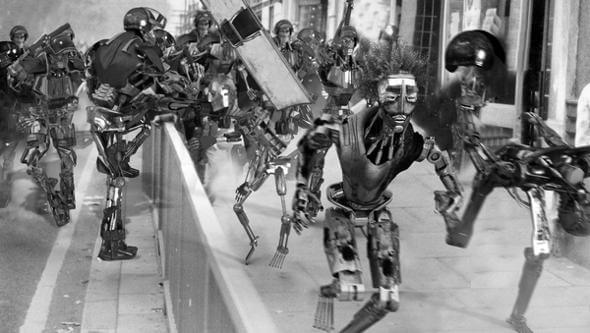
Unemployment, poverty, and oppression can push humans to take desperate actions. Why should robots be any different? Drawing inspiration from the 1981 Brixton Riot in London, Kibwe Tavare’s short film, Robots of Brixton, explores the explosive pressure that urban life imposes on youth struggling to find work, safety, and community. It’s a brilliant film, and a beautiful one. Taken on its surface, Robots of Brixton is a gloriously rendered retelling of one of the darkest days in modern British history, when thousands rioted against racism, a lack of jobs, and a stifling police presence. With curly haired bots standing in for the African Carribbean youth of 80s South London, and sleeker robots in armor representing their police counterparts, Robots of Brixton is filled with enough angst, drug use, violence, and hope to make it worth watching again and again. Check out the full five minutes of the short film in the video below. Is this movie so engaging because it uses robots to remind us of the failures in human history, or because it predicts how we will repeat those failures again with the arrival of a new class of robotic people?
With reproductions of famous shots of the 1981 riot shown clearly in the film, there’s little doubt where Robots of Brixton draws its inspiration. Tavares makes it equally clear in his description of the world he is showing us:
Brixton has degenerated into a disregarded area inhabited by London’s new robot workforce – robots built and designed to carry out all of the tasks which humans are no longer inclined to do. The mechanical population of Brixton has rocketed, resulting in unplanned, cheap and quick additions to the skyline.
The film follows the trials and tribulations of young robots surviving at the sharp end of inner city life, living the predictable existence of a populous hemmed in by poverty, disillusionment and mass unemployment. When the Police invade the one space which the robots can call their own, the fierce and strained relationship between the two sides explodes into an outbreak of violence echoing that of 1981.
Recasting African Caribbean youth as robots highlights the working class struggles of the 80s, and the complex socio-political ramifications of immigrating laborers only to have them face rampant unemployment later.
Yet I’m clearly not a historian. In fact, most of my knowledge of the Brixton Riots comes from repeatedly listening to Eddy Grant’s Electric Avenue in the 80s. (Hmm…maybe that song title makes the connection with robots more obvious.) I’m primarily interested in Robots of Brixton because it is a beautiful short film created using cutting edge computer animation. The production house, Factory Fifteen, and Kibwe Tavares should both be commended for making this movie look so amazing.
Beyond its beauty, however, I find Robots of Brixton pertinent because it brings up a topic I love to discuss: how humanity will need to adjust as we create non-human intelligence. How smart must a machine be before we give it rights? How emotionally savvy can a robot be before it’s no longer moral to give it commands? Can we control artificial intelligence? We may not need answers to these questions for decades, but we will need them. Thirty years ago, unenviable conditions in Brixton led to violent conflict between the UK government and some of its least protected citizens. The Robots of Brixton portends that in another thirty years the same thing could happen again, only with machines. Call me crazy, but I think planning for that possibility may be the only way to avoid seeing the streets slick with blood and oil.
[image and video credits: Factory Fifteen and Kibwe Tavares]
[source: Factory Fifteen’s Robots of Brixton]



